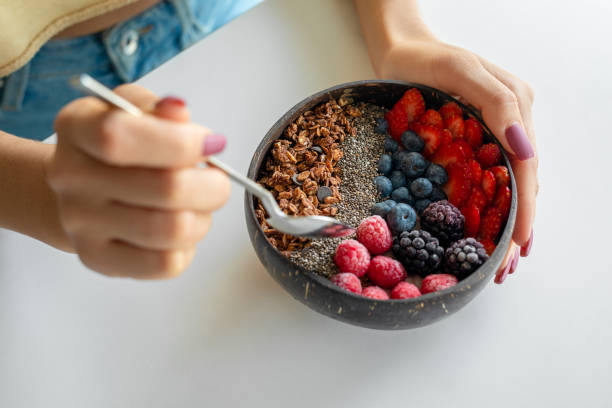When you think of superfoods, do you picture a carrot in a cape or a nectarine with night vision? While the term “superfood” is more marketing than science, there are certain foods packed with extraordinary nutritional benefits. These nutritional powerhouses might not have superpowers, but they offer numerous health advantages, as supported by scientific research.
1. Avocados
Avocado, a staple in modern-day brunches, is more than just a trendy addition to avocado toast. It is rich in magnesium, a mineral that plays a crucial role in regulating blood pressure and blood sugar. Additionally, avocado contains heart-healthy polyunsaturated and monounsaturated fats. These healthy fats can replace saturated fats in your diet, potentially reducing the risk of heart disease, according to the American Heart Association.
2. Pomegranate
Exotic fruits have earned their status as superfoods due to their nutritional content and potential health benefits. Pomegranates, in particular, have shown promise in supporting heart health. Research suggests they could play a role in preventing cardiovascular disease, making them a strong candidate for dietary supplements.
3. Berries
Berries, such as blueberries, are often featured on superfood lists for good reason. While various berries have differing nutritional profiles, they are all low in calories, high in fiber, and packed with antioxidants. These antioxidants help combat cancer-causing free radicals. Blueberries, in particular, are rich in anthocyanin pigments, which act as potent antioxidants and may reduce the risk of diabetes, heart disease, and degenerative diseases like Alzheimer’s.
4. Broccoli
Cruciferous vegetables, including broccoli, are celebrated for their potential to lower the risk of cancer, prevent heart attacks and strokes, and aid in weight management. They are also packed with fiber, which can keep you feeling full longer and contribute to weight loss.
5. Seafood
Fish, rich in protein and healthy fats, stands out as a heart-healthy food. Omega-3 fatty acids, specifically eicosapentaenoic acid (EPA) and docosahexaenoic acid (DHA), found in fish, are efficient at reducing the risk of heart disease, cancer, and Alzheimer’s. The American Heart Association recommends at least two servings of fish per week for optimal health.
6. Garlic and Onions
Allium vegetables like garlic and onions have potent health benefits. Garlic, in particular, has antibacterial and antiviral properties and may help people with diabetes, high cholesterol, and high blood pressure. These vegetables, although pungent, offer a range of health advantages and are delicious additions to your meals.
7. Mushrooms
Mushrooms have been considered superfoods for centuries and are used in traditional Chinese medicine. They possess antibacterial, antioxidant, and anti-inflammatory properties, with some studies suggesting they may have anticancer effects. However, more robust clinical research is required to fully understand their potential benefits.
8. Nuts and Seeds
Nuts and seeds are nutritional powerhouses. They are high in healthy fats, fiber, and protein, making them an excellent choice for a nutritious snack. Walnuts, in particular, are rich in antioxidants, which can help prevent certain types of cancer.
9. Dark, Leafy Greens
Dark, leafy greens like kale, spinach, and collard greens are packed with nutrients. Their vibrant colors are indicative of their high chlorophyll content, which can reduce the risk of colorectal cancer. Carotenoids found in these greens act as antioxidants and are linked to lower cancer incidence.
10. Ancient Grains
Ancient grains like quinoa, farro, and buckwheat have gained popularity for their superior nutritional profiles. They are rich in nutrients, fiber, and vitamins. Opt for whole grains over refined grains for the maximum health benefits.
11. Citrus Fruits
Citrus fruits, such as grapefruits, oranges, lemons, and limes, are known for their fiber and vitamin C content. Consuming oranges regularly has been associated with a reduced risk of macular degeneration in adults aged 50 and older.
12. Kombucha and Kimchi
Fermented foods like kimchi, kombucha, and yogurt are rich in probiotics, which support a healthy gut microbiome. Research suggests that probiotics may play a role in disease prevention and are particularly beneficial for individuals with chronic inflammatory conditions.
13. Dark Chocolate
Unlike milk and white chocolate, dark chocolate offers health benefits due to its rich antioxidant content. Cacao in dark chocolate has been associated with cancer prevention, heart health, and weight management. Additionally, it may improve cognition, prevent memory loss, and boost mood.
Incorporating these superfoods into your diet can provide a range of health benefits supported by scientific research. While there may not be a “superfood” cape, these nutrient-packed foods are indeed super in terms of their potential to enhance your well-being.
